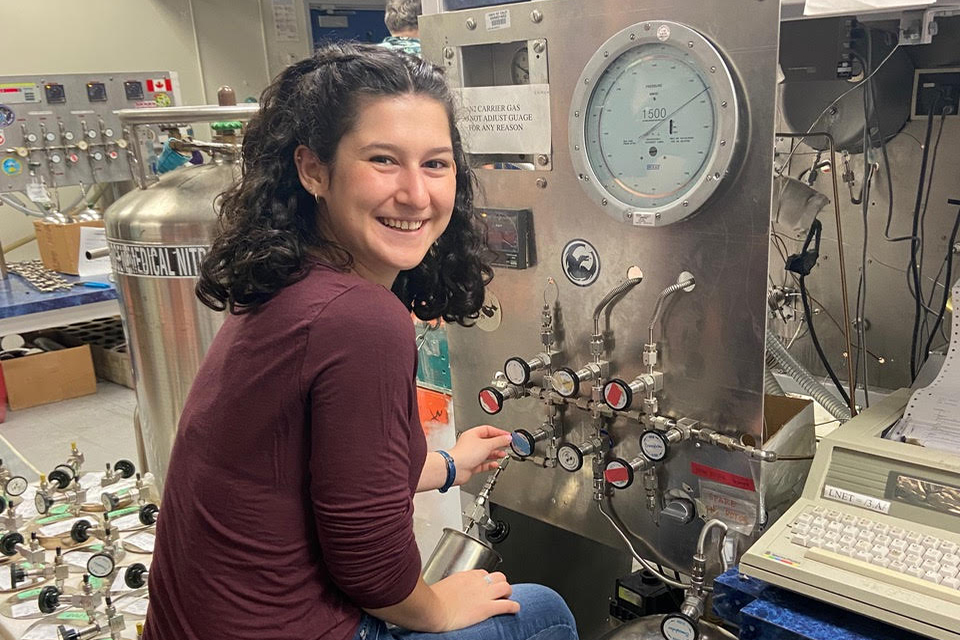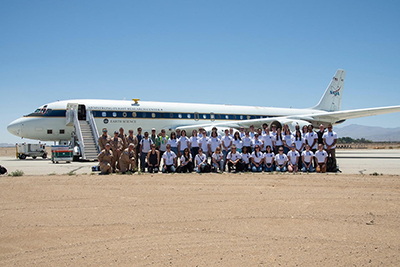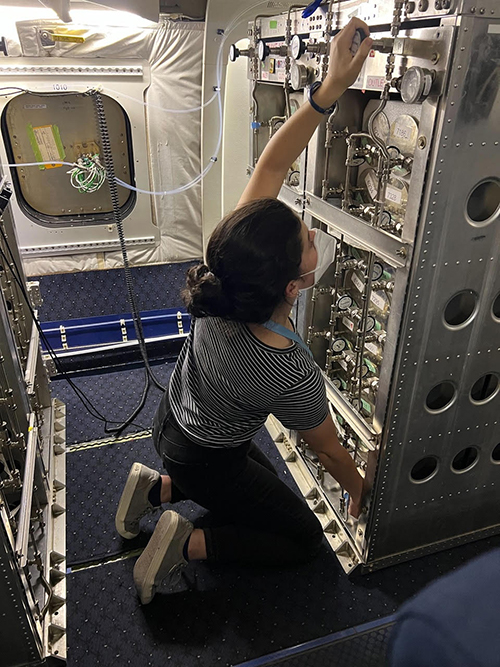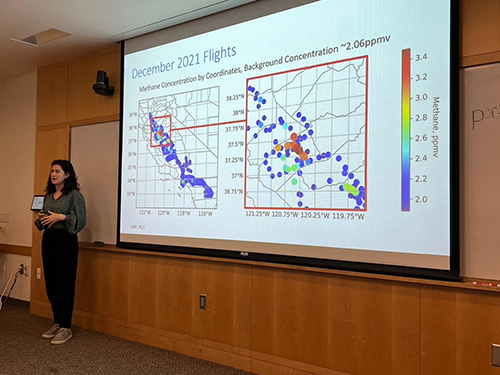Reaching new heights in a NASA internship
Maya Levisohn ’23 spent her summer researching methane concentrations and working with advanced atmospheric technology, all while 40,000 feet in the atmosphere with NASA’s SARP program.
 Photo/Maya Levisohn '23
Photo/Maya Levisohn '23After collecting samples, Maya Levisohn '23 analyzed her findings within the lab at NASA.
Maya Levisohn ’23 spent her summer researching methane concentrations and working with advanced atmospheric technology, all while 40,000 feet in the atmosphere with NASA’s SARP program.
Most people immediately think of rockets launching into outer space when they think of the National Aeronautics and Space Administration. NASA, however, is equally focused on researching the Earth, its climate, and the entire solar system.
The Student Airborne Research Program (SARP) is one of the programs that focuses on studying the Earth. This prestigious summer internship, offered to a limited number of students from across the country, focuses on environmental impact studies ranging from ocean biology to air quality while providing students with hands-on research experience.
Levisohn conducted her research from a NASA aircraft, using pressurized canisters to collect air samples at different elevations to analyze the concentration of methane emissions contributed by dairy farms throughout Southern California.
Levisohn spoke with BrandeisNow about her applied mathematics and environmental studies at Brandeis, future plans, and highlights from her summer in the sky.

Maya Levisohn conducted research 40,000 feet above sea level with SARP.
What inspired you to apply to this internship at NASA?
My friend’s sister had shared the application with me. After researching the program, I was immediately hooked on the idea of participating in hands-on environmental experiments while learning different research techniques and getting to fly on board a NASA aircraft.
As an aspiring environmental engineer, SARP was a perfect way to broaden the scope of my research experience, contribute to meaningful scientific development, meet other climate scientists and students, and challenge myself with new experiences.
Were there any Brandeis courses or professors that prepared you for this experience?
A lot of people who want to become engineers go into engineering focused undergraduate programs. I knew I wanted to go to Brandeis, so coming in I found that applied mathematics and computer science gave me similar skills, even if it isn’t technically engineering. I figured the experiences in the program would prepare me for graduate school as well. Having a background in computer science really came in handy when learning new coding techniques and syntax this summer.
I also felt my experience within the environmental studies program, specifically in professor Sally Warner’s Climate Science course, prepared me for the in depth questions we were exploring. When conducting my research, I built on an understanding of different climate phenomena such as the carbon cycle, radiative forcing, and atmospheric mixing that we learned about in Climate Science.
In order to isolate methane emissions, I had to take into account lots of different variables that could affect greenhouse gas concentrations so background knowledge of Earth systems was key.

Levisohn used an air cannister system to collect samples in the plane.
What was it like conducting research in an aircraft located 40,000 feet above sea level?
My research project, based in Southern California, looked at the seasonal variation of methane emissions and the changes in their concentration in the atmosphere. We were looking at the amount of methane emitted by dairy farms and how it changes by the season.
The aircraft had four groups of students focusing on different topics of research. The plane’s elevation varied from as low as 500 feet to as high as 40,000. Samples were collected using pressurized air canisters every 30 seconds to five minutes, depending where we were located. The group then took the samples back to the lab to analyze the methane concentrations using gas chromatography and flame ionization detection.
I was exposed to different pieces of equipment and technology for the first time, which was an amazing experience.
My work was focused on atmospheric research, but I did get the opportunity to participate in engineering related tasks similar to ones I could do in the field, such as setting up, tearing down, and prepping the canisters used throughout the research process. The program also was environmentally focused, which really opened a lot of doors for me.
I had considered a career in different fields like engineering, climate modeling, airborne science, and data science, but this experience really gave me a full understanding of the skills needed to thrive in these roles. I found myself drawn to the different possibilities and paths my career could go.

Levisohn presented her findings from her summer research.
What were some of your research findings?
My program mentor, Donald Blake - a chemistry professor from the University of California, Irvine - has spent quite some time studying methane emissions in the area. He was really excited about the results we gathered during our research.
At the beginning of the project, we had a theory that there was a variation in emissions produced from dairy farms, depending on the season. We learned that it isn’t the cows producing the variation in methane, but the pools of runoff waste from the stalls where the cows live. This is because methane production is temperature dependent. As a result, more emissions are produced in the summer and less within the winter. Methane is an extremely potent greenhouse gas, more so than carbon dioxide, so it is important for researchers to know where it is coming from.
How will this apply to and influence the rest of your Brandeis experience?
The new techniques and resources I discovered during my internship will be helpful in developing my senior thesis and upcoming computer science courses.
I also think working independently this summer gave me the chance to improve my time management skills and ability to work on my own, sorting through the validity of data and coming to my own conclusions.
Do you know your plans for after graduation?
It’s tough…I have a lot of ideas! I could see myself working in data science or environmental engineering. I could also see myself working for NASA again, as I truly enjoyed my experience. I know I definitely want to work in an industry that is related to climate science. I’m hoping to get a few years of experience working before going to graduate school for my master’s in engineering.
Categories: General, Research, Science and Technology, Student Life





